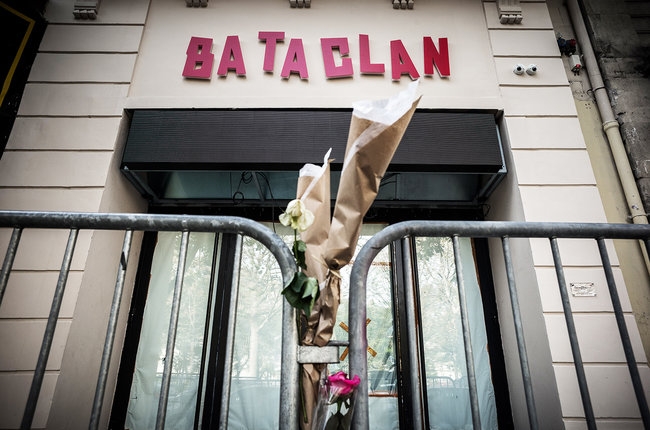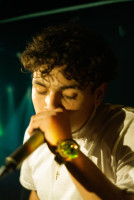Before Aurora in 2012, we felt safe going to movies. Before the Nov. 13 attack at the Bataclan in Paris in 2015, we felt safe going to concerts. And then -- after a bloody, chaotic attack on an audience at an Eagles of Death Metal show that killed 90 -- we added music venues to the list of potential terror targets we need to fret about.
It's been a year since the wave of attacks in Paris that resulted in the deaths of 130 that night, a harrowing evening during which we were glued to our devices as the death toll rose and the enormity of the coordinated assaults on the venue, the Stade de France and on Parisian restaurants and cafés came into focus. That kind of shock to the system tends to result in a paradigm shift in which we change the way we do simple things, like going through airport security, or walking into a rock club for a night of loud, stress-free revelry.
Have we changed in the past year? Billboard got together a panel of security experts, club owners and music fans to ask them how their lives have shifted since Bataclan and what the future looks like in the wake of that terrifying night.
The Club Owner
Joe Shanahan has been in the nightclub business for more than three decades as owner of Chicago's venerable Metro, a 1,100-capacity venue that's around the same size as the Bataclan and has hosted a lot of the same acts, including the EODM. He lives and breathes live music every day and night and, as it happens, was in Paris on a family/work vacation on the night of the terror attacks.
"My family and I were at dinner that night with U2's [longtime] manager Paul McGuinness, who had invited us to see the dry-run of their HBO special afterwards and I noticed my daughter's phone vibrating on the table," recalled Shanahan of that night. "'Dad, something is going on,' she said and then Paul immediately got the same message from U2 security about the city being under attack. Because I was there it shook me to the foundation because I knew the Bataclan and the Eagles of Death Metal and I called their agent at William Morris and asked 'what can I do to help?'"
Because it's in his blood, Shanahan said after reaching out to see how he could lend a hand, his next thought turned to his Metro staff, his patrons and his clients. "I just couldn't take my mind off it," he said. "As I was boarding the plane that following Monday I really thought about safety procedures and felt it was my duty and obligation to create another step." After talking to his staff and security team, Shanahan quickly enacted something that he'd never really done before at the club in the shadow of the Cubs' Wrigley Field: a full frisk of every patron at every show.
"We're a nightclub and we want people to feel that it's cool and it's not the airport or going into a prison situation," he said of the difficult choice to amp up security at the club that has hosted everyone from the Foo Fighters and Smashing Pumpkins to Oasis, the White Stripes, Kanye West, Fall Out Boy and Nirvana. "I talked to my staff and head of security and our paramedic and I said 'today is the day we start making sure we pat people down.'" The Bataclan was charged by terrorists with guns, a scenario Shanahan said he's not sure how you can stop.
But something had to be done and his staff applauded the decision, which mirrored a similar one he made in 2003 after the fire at The Station nightclub in Rhode Island, which took the lives of 100 fans at a Great White show. Back then, Shanahan decided to make a DVD announcement at every show instructing patrons where the nearest exit is so they could escape in case of an emergency, a procedure still in place.
"We had to make some immediate changes and we made a statement," he said of the full frisk and more intensive backpack check that goes on at every Metro show now. "From today we do something different. It slows a lot of stuff down and it takes a bit longer to get into building and some are insulted that we ask them to open their bag or check it, but if you explain it to the patrons and staff that it's for everyone's protection they get it. We're in love with what we do and these evil people know where to go... they know to go to the point of joy. That's the fear and it's not something we're going to stop doing... enjoying ourselves."
The Security Expert
Prevent Advisors have one mission: to keep you safe. The recently launched security division of Tim Leiweke and Irving Azoff's Oak View Group counts among its staff former LAPD chief/NYPD Commissioner Bill Bratton (who serves as chair and an equity partner) as well as Iraq/Afghanistan military veterans and former special forces members CEO Chris Robinette and COO Ben Tolle. Their mission: "Providing holistic security solutions focused on safekeeping the entire sports and live entertainment facility ecosystem." In layman's terms, that means thinking of everything they can to keep you safe at live events.
Robinette told Billboard that he and Tolle are leveraging their counterterrorism expertise to help the Oak View Group's 22-venue stadium alliance do more than buy more metal detectors. "My partner and I have had candid discussions with Commissioner Bratton not just about facilities, but also about how cities go about security at venues," he said. "There's been a lot of interesting dialogue about Paris where everyone realized this is a big issue, but the question is, 'what do you do about it?'"
So far, he said, there has been "a lot of discussion," but very little in the form of the universal shifts needed to secure venues in the same way that, say, airports were hardened after the Sept. 11 terror attacks. "There's still a lot of debate about how to implement policy around it, how to get government bodies [involved] and how to implement resources," Robinette said. "A lot of interesting ideas, but it hasn't really manifested itself as well as you think it should have as a concertgoer."
The attack on the Bataclan was unique in that Robinette said it involved sophisticated actors with a coordinated program to strike multiple targets around the city, what he described as the "catastrophic, worst-case scenario" for sports and entertainment. What officials in Paris have learned is that they need a more holistic approach that ties together local, state and federal government actors working with venue managers, a cooperative structure that still doesn't exist, in Paris or in the United States.
The potential solution -- which Robinette's team is trying to pull together for their arena group (and, in the future, potentially other venues) -- would resemble the response to the 9/11 attacks, after which the TSA was formed to wed government resources and the private sector for a collaborative security framework. "Paris has demonstrated for us the need for this very thing in the sports and entertainment community," he said. "That's the level of cooperation it will take to not just respond, but truly prevent what happened in Paris."
Now, the mechanisms in place are there to "somewhat" prevent harm through the use of metal detectors and wanding, with heightened levels of security at major events like the Super Bowl or the Olympics. "But this threat and risk is just as relevant to address on a Tuesday night," he said. "The big events like Paris or Orlando don't happen on the busiest day of the year, it's when sophisticated actors can penetrate underutilized security mechanisms when not everyone is focused on security concerns."
So, what's the solution and is anybody putting it into place? Robinette said what's needed is an integrated, interagency approach. "Venue managers are only resourced appropriately to secure up to their property line and law enforcement exists to interdict threat streams as they exist but there is very little talk amongst those two parties in the time between events," he said. "Paris has shown us that that event didn't just spontaneously occur. There was someone surveilling those sites, understanding the weaknesses and opportunities when to strike. The threat is continuous, but we're only resourcing ourselves to deal with on the day of or during that event. Anywhere now you have congregations of people is the risk and bad actors are looking for the ones that are underserviced when it comes to security mechanisms."
Giving The Forum in Los Angeles as an example, Robinette said government and state organizations such as the FBI, DHS (Department of Homeland Security) and LAPD are constantly collecting information on threats, but that information doesn't always reach venue managers. At the same time, venues have huge numbers of people coming in that they were collecting data on that doesn't filter up to law enforcement. An organization like the TSA is focused on collecting that information on travelers and threats and merging those two data points to prevent attacks. "Entertainment doesn't have a governing body that says, 'you have to meet this standard.' It's literally left up to the venue managers to address security and he's kind of left to his own devices to do it, not through negligence but because he can't do it beyond the day of the event or his property line," he said.
What's needed, he suggested, is a governing body or standard to look at security in the same way and a fixed collaboration between venue owners and security/public safety officials that clearly defines roles and eliminates the gaps that bad actors can exploit. "Security professionals can provide solutions, but they need funding from the leagues or government grants and no one is currently structurally organized to do that from the resource side," he said.
Robinette and his team have spent a lot of time studying this issue and he said the Arena Alliance is in the midst of developing some solutions that he expects to go to market with soon. He couldn't discuss the specific plans or clients, but said that some include live entertainment and multi-use venues. "We need to harden these venues without ruining the fan experience," he said.
The Music Fans
A week before the presidential election, The National returned to their hometown to play a free show for Democratic presidential candidate Hillary Clinton at open-air Washington Park in downtown Cincinnati. The announced crowd of 3,000 obtained their tickets by responding to a campaign email and entered the venue with a cursory bag check. At a time when anxiety about potential violence at the polls on Election Day was rising, most of the fans Billboard spoke to that night said concert security wasn't really on their mind.
"I would say I haven't changed the way I behave at shows at all," said Amanda Witherell, 27, who described herself as a frequent concertgoer. "It occurs to me that crazy things are happening everywhere in the world right now, but I never have that kind of anxiety when I'm out in public places." She and boyfriend Todd Struve said even in the wake of Paris they don't really look around for the nearest exit or give much thought at all to the potential for an attack at a show when they go out.
Another fan, Dave (who preferred to not give his last name), a 36-year-old high school visual art teacher with two-year-old twins at home, said his wife, Kelly, brought up the idea of potential mischief at the pro-Clinton event due to her anxiety about "a lot of anger" surrounding the election. "He said, 'you can't hide behind what you're supporting,'" Kelly said, recounting their discussion. "And I said, 'I'm not hiding behind it, but I don't want to walk into it.' But I feel ultimately you could walk into danger anywhere."
Both agreed that they wouldn't avoid going to a show out of fear... unless they were bringing their children. "At the end of the day if you're hiding... staying home, you let the 'other side' win," she said. "I think it's really powerful that all these people are not timid about what could happen and they're out here."
Another frequent concertgoer, sculptor Matt Kotlarczyk, 46, said he does think about safety and security every time he goes out, whether it's a concert or any event in a public space. "Walking in here we came in without anyone even taking tickets," he noted of the event that he said appeared to have a low-level security presence. "And we talked about that, 'oh we're in!' I think I actually looked around after we came in without being checked and without a ticket... It's definitely looking around more than we used to."








